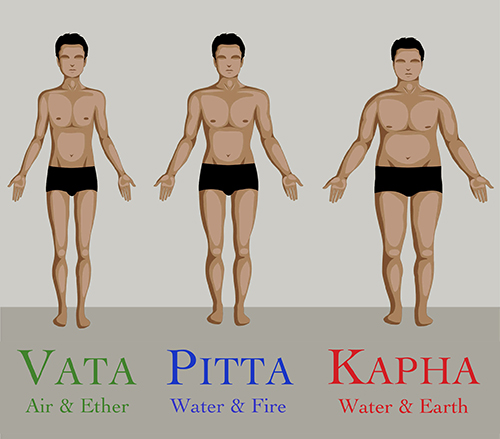Ayurveda is a complete science of living. It teaches us how to create and maintain a unique and harmonious lifestyle. The first step understands the elements like air, fire, water and earth and Doshas like Vata, Pitta and Kapha within our bodies and the environment. Vata governs all movement in the mind and body. Its helps in controlling blood flow, remove toxin from the body, breathing and the formation of the thought across the mind. These doshas also called as the tri energies.
Types of Dosha
- Vata dosha
- Pitta dosha
- Kapha dosha

Vata Doshas
Vata doshas is related with vayu. It represents earth and air factor of the environment. It is also known as the ‘king of the doshas’. It related with the energy which govern the all the biological activities. People who have vata dosha are highly creative and energetic. They have good metabolisms, thin body with little muscle development and weak joints that may make cracking noises also. Even skin is dry, rough and thin with visible vein.

Vata Governs
- Prana Vata: The senses, creative thinking, reasoning, enthusiasm.
- Udana Vata: Quality of voice, memory, movements of thought.
- Samana Vata: Movement of food through digestive tract.
- Apana Vata: Elimination of wastes, sexual function, menstrual cycle.
- Vyana Vata: Blood flow, heart rhythm, perspiration, sense of touch.
Characteristics of Vata Dosha
- Creativity
- Imaginative
- Mental alert
- Walk quickly
- Talk fast
- Cold feet and hand
- Irregular diet
- Full of excitement
- Slender body structure
Physical Characteristics of People with Vata Doshas
- Underdeveloped
- Vein are visible easily,easily cracked and rough
- Flat chest
- Brown complexion
- Cold skin
- Constipation
- Hypertension
- Digestion is sensitive
- Arthritis
- Weakness
- Sleepless
Psychological Characteristics of People with Vata Doshas
- Quick learning
- Short memory
- Fast understanding capability
- No strong will power
- Low confidence
- No tolerance power
- Weak reasoning power
Emotional Characteristics of People with Vata Doshas
- Love excitement
- Energetic
- Quick anger
- Stress
Tips for Balancing Vata
- Drink Herbal Tea and season meals
- Daily ayurvedic massage with sesame oil
- Warm temperatures
- Eat less raw foods
- Lots of rest
- Favor heavy foods and sweet, sour, and salty tastes
- Reduce cold foods and pungent, bitter and astringent tastes
- Avoid stimulants
- Stay warm in cold
Vata-Pacifying Diet
- Eat larger quantities of food, but not overeating.
- Always boil milk before drink it. Don’t drink milk after taking full meal.
- All sweeteners are good for Vata doshas.
- Rice and wheat are very good. Fewer intakes of barley, corn, millet, rye and oats.
- Favor sweet, sour, or heavy fruits, such as oranges, bananas, avocados, grapes, cherries. Reduce dry fruits such as apples, pears, pomegranates, cranberries, and dried fruits.
- Beets, cucumbers, carrots, asparagus and sweet potatoes are good.
- Vata reducing spices: peas, green leafy vegetables, broccoli, cauliflower, celery, zucchini and potatoes and avoid sprouts and cabbage.
- Cardamom, cumin, ginger, cinnamon, salt, cloves, mustard seed and small quantities of black pepper are good.
- All nuts are benefited.
Vata Out of Balance
- Prana Vata: Worries, overactive mind, sleep problems.
- Udana Vata: Dry coughs, sore throats, earaches, general fatigue.
- Samana Vata: Rapid digestion, gas, intestinal cramps, poor assimilation, weak tissues.
- Apana Vata: Intestinal cramps, menstrual problems, lower back pain, irregularity, diarrhea, constipation, gas.
- Vyana Vata: Dry or rough skin, nervousness, shakiness, poor blood flow, stress-related problems.
Daily Routines
- Get up with the sunrise to give the body a chance to activeness.
- Drink a glass of warm water. It helps in cleaning the digestive tract and bowel movement.
- Brush the teeth at least in the morning and before going to bed.
- Scrape the tongue daily which stimulate the digestive system and removal of toxins.
- Massage the body with oil.
- Meditate and practice correct Yoga Poses.
- Never skip breakfast.
- Take a short walk after breakfast. Walking after meals stimulates digestion.
- Eat lunch properly in time.
- Eat dinner before the sun goes down.
- Give proper time for sleep at night.
